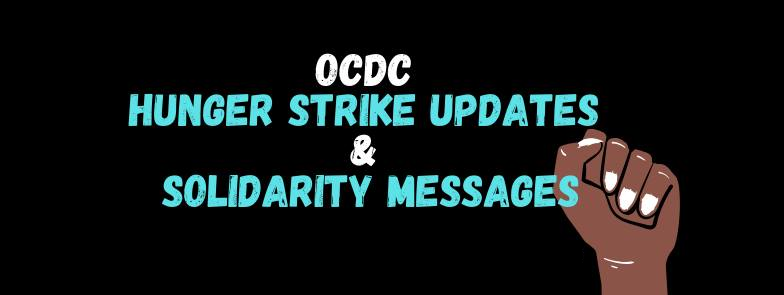5 June 2020 (unceded and unsurrendered Algonquin Territory / Ottawa) – Today at 2:00pm, the Criminalization and Punishment Education Project (CPEP) will livestream three statements on their Facebook page: an update on the hunger strike from Deepan Budlakoti, a message of solidarity from Indigenous prisoners, and a letter of solidarity from the minimum area of the jail read by Aaron Wilson. The hunger strikers from the 3B maximum unit at the Ottawa-Carleton Detention Centre (OCDC) ended their hunger strike, effective 4 June 2020 at 3:30pm, having won key concessions from the jail’s administration and the Ontario Ministry of the Solicitor General. During the 31-hour hunger strike, the group of men were able to successfully negotiate an agreement with the jail based on a list of counter proposals, which they presented to the administration following their original list of demands.
Prisoners from all areas of the jail, including the women’s side, expressed their support for all the demands made by the 3B hunger strikers, most of whom are racialized men that have experienced racism and other forms of discrimination throughout their lives. Although many demands have been met (see the summary below), people confined in other areas of the jail remain concerned about a host of longstanding and recent issues associated with pandemic measures that require redress that have been reported to CPEP’s Jail Accountability & Information Line.
-
Agreement Between the OCDC Hunger Strikers, the Jail’s Administration, and the Ministry
Food:
-
OCDC promised to deliver a small cup of peanut butter and a portion of Cracker Barrel cheese to every prisoner who is on a Halal diet with every meal they receive. This is an interim decision pending the reinstatement of the meal trays prisoners were receiving prior to 25 May 2020.
-
OCDC promised to reinstate the peanut butter cups and flat-bread for people who are on a Kosher diet indefinitely, effective immediately.
-
OCDC promised to withdraw the inedible new trays and revert to the old diet prisoners were receiving prior to 25 May 2020. OCDC did not provide a deadline for this, but prisoners agreed in good faith. Prisoners recognize that this will not solve the food issues that have been longstanding even prior to the change that came into effect in late-May 2020, but this commitment represents a step in the right direction.
-
OCDC promised to add pears to the fruit rotation within a short, but undetermined timeframe.
Canteen:
-
Anyone incarcerated at OCDC, even those without any skin or hair condition that would require medicated products, can now request lotion, body wash, and anti-bacterial liquid hand soap directly from the doctor. The jail’s administration promised to automatically approve their requests.
-
The Ministry of the Solicitor General’s Corporate Services Division promised to make lotion and liquid hand soap readily available on the canteen effective immediately. The administration informed the hunger strikers that the liquid hand soap was suspended due to labelling issues.
Reading Materials and Television:
-
The OCDC promised the hunger strikers that the new, long-delayed magazine policy will be implemented by the hard deadline of 30 June 2020. Family members and supporters of prisoners can now purchase magazine subscriptions for their loved ones behind bars. OCDC promised to deliver these subscriptions under the condition that prisoners only receive magazines that are sold by the company that has the contract for the canteen.
-
The jail’s administration also promised to explore procedures that can ensure prisoners have access to at least five books per prisoner per month—similarly to Central East Correctional Centre’s book policy. This would be especially beneficial to self-represented accused who are on pretrial custody and require materials to defend themselves against state accusations.
-
The OCDC administration promised to (a) keep TVs on until 1:30 am as long as court closures continue as part of the provincial COVID-19 public health measures and (b) to look into adding channels to the current cable package.
-
While the ministry claims that the needs of prisoners at OCDC are met,1 people incarcerated at OCDC have to go to great lengths to assert that these concessions will not alleviate many of the pains associated with imprisonment, nor satisfy their most basic needs. Long before the 25 May 2020 changes to the food system, the quick chill meals provided by Compass Group were insufficient. When new draconian policies were imposed at OCDC in the name of pandemic management and public health, it was the straw that broke the camel’s back.
Prisons are inherently harmful institutions during and outside of pandemic times. The hunger strikers recognized this in their negotiations with the jail’s administration and renounced some of their demands to avoid state responses that would further entrench carceral logics and modes of operation. This is particularly true for their earlier demands around increased access to yard and alternatives to visitations. The OCDC administration explained to the strikers that longer yard access times would necessitate building a new yard. Being against jail expansion, the group sacrificed longer yard time. They were also reluctant to press on the alternatives to visitation demand, fearing that the Ministry would not resume physical visitations once the restrictive COVID-19 measures are lifted. Other demands were abandoned by the strikers as part of negotiating with the jail’s administration in good faith.
Following the conclusion of the hunger strike, a group of incarcerated Indigenous peoples communicated very serious concerns about the systemic discrimination they face at the Ottawa jail. The Indigenous prisoners are currently held in a unit where they represent roughly a third of the people imprisoned there, which is a reflection of the on-going colonialism, systemic racism, and mass criminalization and incarceration Indigenous peoples are subject to. The group has made demands (see below) and is committed to working with the jail’s administration through internal request and complaint processes with the hope that their voices will be heard and human rights issues resolved. CPEP remains committed to standing in solidarity with all OCDC prisoners to reduce the harms associated with incarceration to the degree that is possible until such time that a just transition from the Canadian colonial carceral state takes place.
-
Statement by Indigenous Prisoners Held at OCDC
We stand in solidarity with the hunger strikers on 3B and support all of their demands. We would also like to stress, however, that we – Indigenous prisoners – face specific barriers within and outside of these walls. We share our concerns with the wider public with the hopes that the OCDC administration will start respecting our identities and humanity, and accommodate our cultural, spiritual and dietary needs:
-
OCDC refuses to provide our traditional medicines in the appropriate bags or bundles even after we warn the jail that this practice violates our rights.
-
Carceral officers insist on physically handling our sacred medicines when passing them to us. They usually do so with no gloves. When we advise them that this practice violates our rights, they shrug-off our concerns. We are especially worried for our health and safety during this global pandemic.
-
When asked for indoor accommodations to smudge due to unforgiving weather conditions that interfere with our ability to practice outdoors, we are refused access to the designated program room, which has venting and fan capability.
-
During pre-pandemic times, the OCDC only allowed us once to practice the change of season ceremony on 21 June 2019. The jail denied the last three change of season ceremonies. When we asked the administration, a deputy superintendent offered no explanation why and no guarantee that the next ceremony will take place on 21 June 2020.
-
The jail refuses to provide us with alternative cultural and spiritual activities when these have been suspended since the beginning of the COVID-19 crisis.
-
A major portion of Indigenous cultural practices are communal ceremonies. Social distancing and other COVID-19 measures prohibit regular methods of engaging in these cultural practices. The jail has not provided nor did they engage us in a dialogue about an alternative.
-
We are refused the right to access culturally specific diets as afforded, albeit in an insufficient way, to other people who adhere to religious or personal belief systems such as Muslim and Jewish faiths. For Indigenous persons who are born and raised on reservations and consume mostly game meat diets, the sudden change is difficult and contributes to our suffering from imprisonment and other colonial practices.
The issues above need to be addressed in order to respect our human rights and dignity. There can be no reconciliation without ending the injustices we routinely face here and everywhere.
-
Prisoners who supported all the hunger strikers’ demands also have additional demands that require action by the OCDC administration and ministry, including:
-
OCDC must provide the appropriate personal protective equipment to all prisoners for them to wear on a voluntary basis.
-
The canteen company must stop charging people a $5 cancellation fee, which we sometimes incur for orders we never made.
-
OCDC must provide diabetic prisoners, who only have access to two diabetic-specific commissary items, with a wider canteen selection.
-
OCDC must improve our canteen list by at least providing us with a list of items comparable to the one at the Central East Correctional Centre.
-
OCDC must install an additional TV in each unit in the pod to enable all prisoners in the bottom tier to see the screen.
-
OCDC need to provide prisoners wireless headphones to decrease the noise and alleviate some of the tension on the ranges.
Despite the trauma inflicted by the Ontario jail system on prisoners, incarcerated people remain willing to work with the OCDC administration and Ministry of the Solicitor General in good faith to address their concerns to the extent possible within a site of confinement.
For media interviews contact:
Souheil Benslimane
Lead Coordinator, Jail Accountability & Information Line



